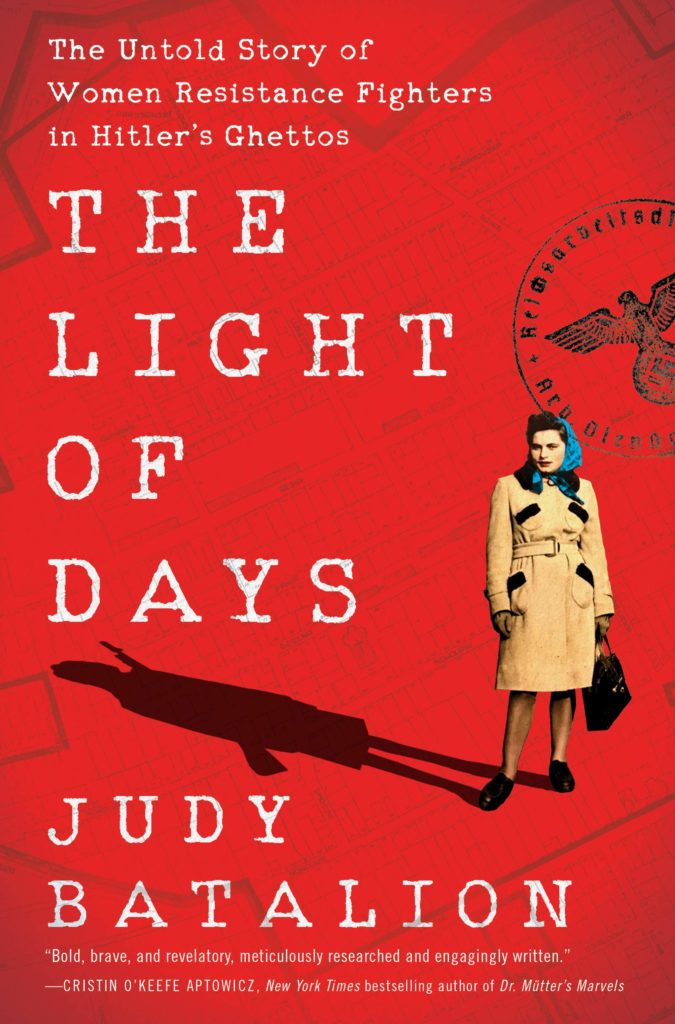Review: ‘The Light of Days’ by Judy Batalion
By Hannah Cogen
Posted on

Some stories are just too amazing not to be told. In Judy Batalion’s Light of Days: The Untold Story of Women Resistance Fighters In Hitler’s Ghettos, she uncovers the incredible stories of brave young women during the Holocaust. In the midst of horror, these women banded together and formed a deadly militia in which they called themselves, the “Ghetto Girls.” The book begins with a powerful and heartbreaking quotation taken from a song about the Warsaw Ghetto uprising and written by a young Jewish girl before her death: “With graves on street corners, Will outlive her enemies, Will see the light of days.”
The women in Light of Days had unwavering courage that allowed them to choose the more difficult and honorable path, to fight the Nazi regime. Batalion follows the incredible and risky journey of Renia Kukielka who acted as a messenger and a weapons smuggler for the resistance. She travelled on foot and by train through Nazi-occupied Poland. Batalion describes Renia as “neither an idealist nor a revolutionary but a savvy, middle-class girl who happened to find herself in a sudden and unrelenting nightmare, fueled by an inner sense of justice and by anger.” Renia’s experiences created such an intense drive for reprisal that not only was she willing to put herself in incredibly dangerous situations, but she was also able to survive them. . Batalion describes Zivia, a member of the Ghetto Girls, “The dream for most girls was to flee Nazi occupation, Zivia came back.” Zivia put herself in the middle of the fighting by not only joining the Ghetto Girls but also by becoming a leader in the Warsaw ghetto uprising as well as the Jewish Fighting Organization. Despite the Nazi’s attempts to discourage, oppress, and belittle, these women remained steadfast in their missions and displayed tremendous courage.
It may be difficult to understand how these women could be so strong despite their horrific circumstances. It is evident that their strength was forged in hardship. This hardship can be seen in this quote describing Gestapo treatment, “several buses of Gestapo forced Jews, half-naked, barefoot in nightclothes, to go outside and run around the snow-filled market while the Gestapo chased them with rubber clubs or told them to lie down in the snow for thirty minutes, or forced them to flog their fellow Jews with whips, or to lie on the ground and have a military vehicle run over them.” Batalion describes Jewish accounts of Nazi treatment in vivid detail, yet they are still unimaginable. Although these women were dehumanized and denigrated, they refused to succumb to victimization, oppression, and fear. They fought against their oppressors and against the idea that they were anything less than powerful and deserving of rights and respect.
Hidden in plain sight, these women did the unexpected. As a result of the tremendous sexism in Nazi-occupied territories, in the minds of many, women were weak and incapable. These women were underestimated and overlooked. No one thought that they could have “paid off Gestapo guards, hid revolvers in loaves of bread, and helped build systems of underground bunkers.” They also “flirted with Nazis, bought them off with wine, whiskey, and pastry, and, with stealth, shot and killed them.” Unlike many nonfiction and fiction writings, their accomplishments were not despite their femininity, but because of it.
These women’s achievements and courage, provide a satisfying aspect to a book otherwise filled with uncomfortably accurate accounts of the atrocities committed against the Jews. In the ultimate form of resistance, these women turned their mistreatment into a strength that allows the reader to form an attachment to the women in this story. Light of Days is a book guaranteed to make the reader wonder, “why have I not heard these stories before?”
– Hannah Cogen